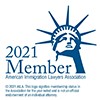IMPORTANT NOTE: Most non-U.S. citizens must report a change of address within 10 days of moving within the United States or its territories by filing AR11.
http://www.uscis.gov/ar-11
If you have a pending application with USCIS then you must complete AR11 and the change of address on this following link so that notices from USCIS do not go to the old
address. https://egov.uscis.gov/casestatus/landing.do
Disclaimer: The information provided on this website is of a general nature and may not apply to any particular set of facts or under all circumstances. It should not be construed as legal advice and does not establish an attorney-client relationship.






